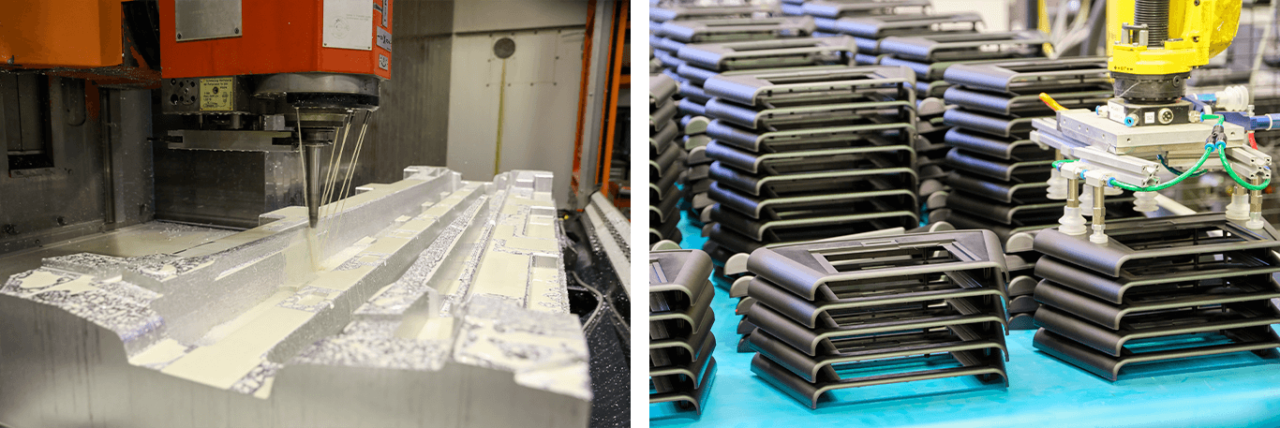Fast, affordable and always ‘first time right’
Since being founded in 1967, Holmatro has developed into a market leader in the development and manufacture of hydraulic rescue equipment.
In 1995, Promatrix became one of the first firms in the Netherlands to produce aluminium moulds. Now, 25 years later, Promatrix continues to excel in this niche market. They do all this in their own production plant and injection-moulding department in the green fields of Zegveld.
When Porsche or Volkswagen need a bumper for a prototype of a new car, they call Promatrix. And if Philips needs to produce a part made for one of their medical devices, Promatrix is involved. Do you need a shade for a street light, a part for a manure robot or a component for feeding troughs in livestock stalls? Promatrix can make it. No matter how impressive Promatrix’s portfolio may be, its location in the green fields of Zegveld is just as remarkable. The company has been based at this location for many years. They supply major customers in many different industries with aluminium moulds and injection-moulded parts, from small to very large. They recently also began producing milled aluminium parts. ‘The combination of mould-making and injection-moulding is fairly unique in the Netherlands’, says manager Laurens Vogelaar. ‘You can count the number of companies that do both on one hand.’

Aluminium moulds
Laurens takes care of day-to-day management at the company together with his fellow managers Martijn Boukens (engineering), Erik Schalkwijk (machining) and Kees Langerak (moulds and injection moulding). He is responsible for sales and marketing. ‘When Bram de Koning founded Promatrix in 1995, we were one of the first firms in the Netherlands to produce aluminium moulds (the moulds required to make plastic products). These are usually made from steel. The advantage of aluminium is that you can make small production runs quickly and economically. While several companies now do this, it is still a niche market. Sixty percent of the moulds we make are trial moulds for the automotive industry: they often need plastic parts to test cars, including bumpers, dashboards or the mechanisms for car mirrors. We also do a lot of work for companies in the manufacturing industry. Their needs include plastic housings for equipment, and technical parts for machines. Whatever you can think of, we make it. We do not sell products of our own; everything we make is for other companies. Customers come to us with a CAD model and we take care of the rest. That’s what makes our industry special: we are involved with all the steps required to develop a product, which means we witness the birth of many different products. It is a pleasure to work with our many fantastic customers.’
Accepting challenges
A cool and calm mindset, and a smart approach to work, are important to the success of Promatrix. Owner Bram even lets his managers handle all interviews, because he believes they make all the difference. The company is at the forefront of many new developments. Laurens: ‘We have our own CNC department where we mill aluminium parts. These are all moulded components. If you can mill them, you can also make aluminium parts for machine builders. As a result, we are increasingly becoming a “parts supplier”. We currently make aluminium parts for a select group of customers, but this will certainly expand in the future. If necessary, we can also help our customers to investigate and choose new materials. Bioplastics are a growing phenomenon, for example. We recently worked with a customer to produce trial packaging with this material. We aren’t afraid of challenges like this; in fact, we love them. We are also not afraid of taking risks in the market. If we see an opportunity to do business and add value for customers, we seize it. For example, Bram was not satisfied with the automation systems supplied by machine manufacturers, so he began developing his own. This resulted in Cellro, which is a new and successful company based in Veenendaal. Promatrix makes parts for their machines.’
While Promatrix is attached to its very special and authentic location in Zegveld, relocation can no longer be avoided. If everything goes according to plan, construction work on the company’s new premises in Bodegraven will start this year. ‘The main reason is simply a lack of space. We are acquiring more and more machinery and, at a certain point, there will not be enough space for it here. In addition, this is not the ideal region for finding technical staff. It isn’t easy to reach by public transport, and we are reliant on good people, just as any other engineering company. We give our employees a great deal of freedom and responsibility to do their job in their own way. We hope to be able to welcome them to our new location from next year.’
This article originates from OnderNamen Woerden – Lente 2020
© text: Kelly Bakker